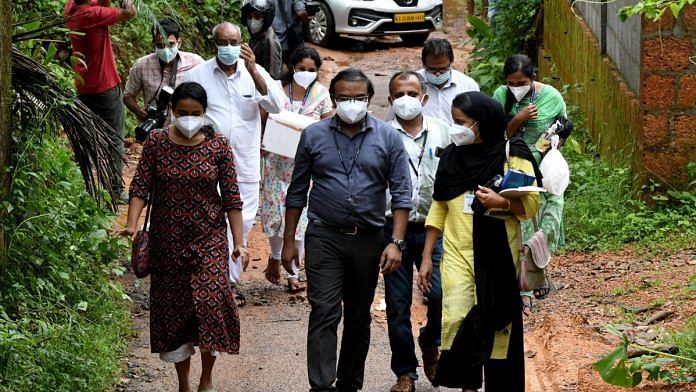Thiruvananthapuram: In the wake of a Nipah outbreak in Kerala’s Kozhikode district, the ICMR has delivered the antibody requested by the state to combat the deadly virus. A mobile laboratory was also sent to ground zero to enable the state to test samples.
The monoclonal antibody was delivered in Kozhikode by the Indian Council of Medical Research (ICMR) on Thursday. The antiviral is the only option available to the government to treat infections, although its efficacy has not been clinically proven yet.
The ICMR’s National Institute of Virology (NIV) in Pune sent its mobile BSL-3 (Biosafety Level-3) laboratory to Kozhikode to test samples for the virus in the district itself after five cases, including two deaths, were recorded.
Meanwhile, in a relief to the state government, the 11 samples sent for testing returned negative results for the virus.
A government source confirmed the negative results.
The samples of another 15 people in the high-risk contact list have also been sent for tests.
A five-member central team comprising experts from the National Centre for Disease Control, RML Hospital and NIMHANS has been stationed in Kerala to take stock of the situation and assist the state government in the management of the Nipah infection.
Apparently, samples will also be collected from bats to check for the virus’ presence.
Kerala Health Minister Veena George said the stability of the antiviral was discussed with a central expert committee.
“Further steps or course of action will be decided by the expert committee,” she said and referred to consultations between the state and the Union Health Ministry.
The ICMR’s mBSL-3, the first Biosafety Level-3 containment mobile laboratory in south Asia, will help early testing and detection of the infection at the district level itself.
Earlier, the samples had to be sent to the National Institute of Virology in Pune.
The mobile laboratory was set up in February 2022 to investigate newly emerging and reemerging viral infections that are highly infectious and potentially lethal for humans.
Additionally, a fully-equipped mobile virology testing laboratory of the Rajiv Gandhi Centre for Biotechnology (RGCB) was dispatched to the northern Kerala district to strengthen virus testing and detection.
This is the fourth time the viral infection has been confirmed in the state. It was detected in Kozhikode in 2018 and 2021 and in Ernakulam in 2019.
The m102.4 monoclonal antibody, an experimental therapeutic, was imported during the 2018 Nipah outbreak for the treatment of infected patients on compassionate grounds. It was not used back then as the outbreak had ended by the time it arrived.
The standard operating procedures and protocols for its use were prepared at the time with the ICMR’s support.
George also lauded the RGCB for stepping in to help with the containment efforts and said more samples can now be tested.
RGCB Director Prof Chandrabhas Narayana said the services of a group of six experts have been made available in the mobile unit, which can give results within six hours.
Union Minister of State for Health and Family Welfare Bharati Pravin Pawar reviewed the steps taken for the containment of the outbreak and visited NIV, Pune, to take stock of the preparations.
The district administration has already declared a holiday for educational institutions in Kozhikode on Saturday (September 16), in addition to Thursday and Friday.
George said in the assembly that there is no need to be apprehensive about the Nipah outbreak but added that people need to exercise caution as they go about their daily activities.
“There is no need for any apprehension. We can all together deal with the issue with caution,” she said.
George said the state has been vigilant and Kozhikode’s neighbouring districts — Kannur, Wayanad and Malappuram — should also be cautious.
The minister said a 19-member core committee, call centres and a control centre have been set up in Kozhikode, along with isolation, ventilator and ICU facilities in the medical college there.
Additionally, psychosocial support teams have been constituted to counsel the infected or their family members and the treatment protocol has been further improved, the minister said.
She also advised people to wear masks, maintain social distance and approach health workers in case anyone shows symptoms of cold, fever, headache or cough.
The minister also said that in areas where bats are present, liquor collected in open vessels from coconut and palm trees should not be consumed.
On Wednesday, a 24-year old health worker became Kerala’s fifth confirmed Nipah case of the latest outbreak.
Of the three infected people under treatment, the condition of a nine-year-old boy remains critical.
The virus strain seen in the state is the Bangladesh variant that spreads from humans and has a high mortality rate despite being less infectious, the government has said.
World Health Organization and ICMR studies have found that the entire state, not just Kozhikode, is prone to such infections. People living in forest areas have to take the highest precautions, it said, adding that the latest virus originated within five kilometres of a jungle area.
Around 11 wards in Kozhikode district were declared as containment zones till Wednesday evening. PTI HMP PLB TGB SZM SZM
This report is auto-generated from PTI news service. ThePrint holds no responsibility for its content.



